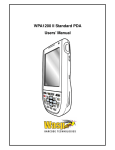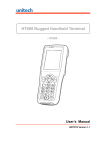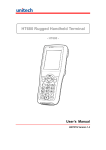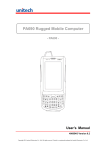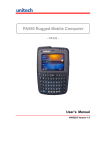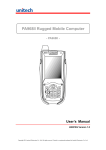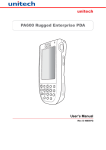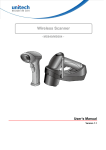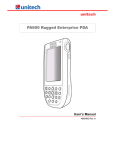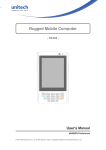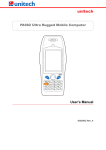Download Unitech PA600
Transcript
PA600 II Standard PDA - PA600 II - Unitech is a member of Oracle Embedded Software Licensing Program User’s Manual 400769G Version 1.0 Preface About This Manual This manual explains how to install, operate and maintain the PA600 II mobile computer. No part of this publication may be reproduced or used in any form, or by any electrical or mechanical means, without permission in writing from the manufacturer. This includes electronic or mechanical means, such as photocopying, recording, or information storage and retrieval systems. The material in this manual is subject to change without notice. © Copyright 2009 Unitech Electronics Co., Ltd. All rights reserved. Unitech global website address: http:\\www.unitech-adc.com Bluetooth is a registered trademark of Bluetooth SIG. Microsoft, Windows and ActiveSync are either registered trademarks or trademarks of Microsoft Corporation. Other product names mentioned in this manual may be trademarks or Registered trademarks of their respective companies and are hereby acknowledged. Unitech is a member of Oracle Embedded Software Licensing Program. i Regulatory Compliance Statements FCC Warning Statement This equipment has been tested and found to comply with the limits for a Class B digital device, pursuant to part 15 of the FCC rules. These limits are designed to provide reasonable protection against harmful interference in a residential installation. This equipment generates, uses and can radiate radio frequency energy and, if not installed and used in accordance with the instructions, may cause harmful interference to radio communications. However, there is no guarantee that interference will not occur in a particular installation. If this equipment does cause harmful interference to radio or television reception, which can be determined by turning the equipment off and on, the user is encouraged to try to correct the interference by one or more of the following measures: –Reorient or relocate the receiving antenna. –Increase the separation between the equipment and receiver. –Connect the equipment into an outlet on a circuit different from that to which the receiver is connected. –Consult the dealer or an experienced radio/TV technician for help. 1. 2. 3. This Transmitter must not be co-located or operating in conjunction with any other antenna or transmitter. This equipment complies with FCC RF radiation exposure limits set forth for an uncontrolled environment. To maintain compliance with FCC RF exposure compliance requirements, avoid direct contact to the transmitting antenna during transmitting. Any changes or modifications (including the antennas) made to this device that are not expressly approved by the manufacturer may void the user’s authority to operate the equipment. FCC Label Statement This device complies with part 15 of the FCC rules. Operation is subject to the following two conditions: 1. This device may not cause harmful interference, and 2. This device must accept any interference received, including interference that may cause undesired operation. ii Canadian Compliance Statement This Class B Digital apparatus meets all requirements of the Canadian Interference-Causing Equipment Regulations. Cet appareil numerique de la classe B respecte les exigences du Reglement sur le material broilleur du Canada. The device is certified to the requirements of RSS-139-1 for 2.4 GHz spread spectrum devices. European Conformity Statement Declaration of Conformity with Regard to the R&TTE 1999/5/EC and EMC 89/336/ EEC directives. RoHS Statement This device conforms to RoHS (Reduction Of Hazardous Sub-stances) European Union regulations that set maximum concentration limits on hazardous materials used in electrical and electronic equipment. Taiwan NCC Warning Statement 交通部電信總局低功率電波輻射性電機管理辦法 (930322) 根據交通部低功率管理辦法規定: 第十二條 經型式認證合格之低功率射頻電機,非經許可,公司、商號或使用者 均不得擅自變更頻率、加大功率或變更原設計之特性及功能。 第十四條 低功率射頻電機之使用不得影響飛航安全及幹擾合法通信;經發現有 幹擾現象時,應立即停用,並改善至無幹擾時方得繼續使用。前項合 法通信,指依電信法規定作業之無線電通信。 低功率射頻電機須忍受合法通信或工業、科學及醫療用電波輻射性電 機設備之幹擾。 iii Laser Information The Unitech PA600 II series is certified in the U.S. to conform to the requirements of DHHS/CDRH 21CFR Subchapter J and to the requirements of IEC 825-1. Class II and Class 2 products are not considered to be hazardous. The PA600 II series contains internally a Visible Laser Diode (VLD) whose emissions do not exceed the maximum limits as set forth in the above regulations. The scanner is designed so that there is no human access to harmful laser light during normal operation, user maintenance or during prescribed service operations. The laser safety warning label required by the DHHS/IEC for the PA600 II series' optional laser scanner module is located on the memory compartment cover, on the back of the unit. CAUTION! Use of controls or adjustments or performance of procedures other than those specified herein may result in hazardous laser light. Use of optical instruments with the scanner will increase eye hazard. Optical instruments include binoculars, microscopes, and magnifying glasses. This does not include eye glasses worn by the user. Battery Notices The PA600 II is equipped with a Lithium-Ion battery pack and backup battery. Both batteries will discharge after an extended period of not being used. When both batteries are discharged, recharge the unit for 16 hours in order to fully charge the main battery and backup battery. Recharge the PA600 II through the following: 1. Plug the USB charging cable to the PA600 II and plug the 5V/2A AC-DC adapter to the power jack of the USB charging cable. 2. Place the PA600 II into the docking station and plug the 5V/2A AC-DC adapter to the power jack of the docking station. iv If the main battery is removed, the backup battery ensures the data on SDRAM is safe for up to 6 hours. To prevent data loss, do not leave the PA600 II uncharged with the main battery removed for an extended period. For more details, refer to page 8, Charging the Battery. Note: Rechargeable batteries are advised to replace every year or when 500 charge/discharge cycles achieved to guarantee optimal performance. It is normal that the battery balloons or expands beyond one year or the maximum of 500 cycles. Although it does not cause harm, it cannot be used again and must be disposed of according to the location's safe battery disposal procedures. If the performance decrease is greater than 20% in a Lithium-Ion battery, the battery is at the end of its life cycle. Do not continue to use, and ensure the battery is disposed of properly. The length of time that a battery power lasts depends on the battery type and how the device is used. Conserve the battery life through the following: Avoid frequent full discharges because this places additional strain on the battery. Several partial discharges with frequent recharges are better than a deep one. Recharging a partially charged lithium-Ion battery does not cause harm because there is no memory. Keep the lithium-Ion battery cool. Avoid a hot car. For prolonged storage, keep the battery at a 40% charge level. Do not leave the lithium-Ion battery discharged and unused for an extended period because the battery will wear out and the longevity of the battery will be at least shorter than half of the one with frequent recharges. Battery charge notice It is important to consider the environment temperature whenever the Lithium-Ion battery pack is charged. Charging is most efficient at normal room temperature or in a slightly cooler environment. It is essential that batteries are charged within the stated range of 10°C to 45°C. Charging batteries outside of the specified range could damage the batteries and shorten their charging life cycle. CAUTION! Do not charge batteries at a temperature lower than 0°C, which will increase the internal resistance to cause heat and make the batteries unstable and unsafe. Please use a battery temperature-detecting device for a charger to ensure a safe charging temperature range. Further, to protect and avoid battery v from inflating, the battery is detected for thermal protection and will not be charged when the temperature of battery is over 50 degrees. Storage and safety notice Although charged Lithium-Ion batteries may be left unused for several months, their capacity may be depleted due to build up of internal resistance. If this happens they will require recharging prior to use. Lithium-Ion batteries may be stored at temperatures between -20°C to 60°C, however they may deplete more rapidly at the higher temperature ranges. It is recommended to store batteries within normal room temperature ranges. Warranty The following items covered under Unitech Limited Warranty are free from defects during normal use: PA600 II – 1-year limited warranty. Lithium-Ion battery – 6-month limited warranty. Warranty becomes void if equipment is modified, improperly installed or used, dam-aged by accident or neglect, or if any parts are improperly installed or replaced by the user. Use only the adapter supplied. Using the wrong adapter may damage the unit and will void the warranty. vi Table of Contents PREFACE ............................................................................................................................... I ABOUT THIS MANUAL ..................................................................................................... I REGULATORY COMPLIANCE STATEMENTS ................................................................... II FCC Warning Statement ......................................................................ii FCC Label Statement...........................................................................ii Canadian Compliance Statement ....................................................... iii European Conformity Statement......................................................... iii RoHS Statement ................................................................................. iii Taiwan NCC Warning Statement ........................................................ iii LASER INFORMATION ..................................................................................................... IV BATTERY NOTICES ......................................................................................................... IV Battery charge notice ...........................................................................v Storage and safety notice ...................................................................vi WARRANTY ..................................................................................................................... VI CHAPTER 1 GETTING STARTED .......................................................................................................... 1 INTRODUCING THE PA600 II .......................................................................................... 1 FEATURES ........................................................................................................................ 2 PACKAGE CONTENTS ..................................................................................................... 3 A TOUR OF THE PA600 II STANDARD........................................................................... 4 Front Left View .................................................................................... 4 Back View ........................................................................................... 5 vii GETTING STARTED.......................................................................................................... 6 Installing the Battery............................................................................ 6 Charging the Battery ........................................................................... 7 CHAPTER 2 USING THE HARDWARE .............................................................................................. 12 KEYPADS AND FUNCTION BUTTONS ........................................................................... 12 ADJUSTING THE SCREEN BRIGHTNESS ..................................................................... 13 USING THE STYLUS ....................................................................................................... 13 USING THE SD/MMC MEMORY CARD ........................................................................ 14 USING THE LASER SCANNER....................................................................................... 15 CHAPTER 3 GETTING CONNECTED ................................................................................................. 18 ESTABLISHING DEVICE-PC CONNECTION ................................................................. 18 SYNCHRONIZING WITH YOUR COMPUTER ................................................................. 21 SYNCHRONIZING INFORMATION................................................................................... 27 USING ACTIVESYNC TO EXCHANGE FILES ................................................................ 28 CHAPTER 4 BAR CODE SCANNER PROGRAMS ........................................................................ 30 SCAN2KEY ..................................................................................................................... 30 SCANNER SETTING ....................................................................................................... 30 Bar code Symbologies ...................................................................... 31 CHAPTER 5 ADVANCED SETTINGS.................................................................................................. 33 ADJUSTING SETTINGS .................................................................................................. 33 CHECKING THE MAIN AND BACKUP BATTERY STATUS ............................................ 34 viii EXTENDING BATTERY LIFE .......................................................................................... 35 VIEWING FLASH MEMORY FILES ................................................................................. 37 PERFORMING A HARDWARE RESET ............................................................................ 38 APPENDIX I ADVANCED SETTINGS.................................................................................................. 41 APPENDIX II WORLDWIDE SUPPORT ............................................................................................... 43 ix Chapter 1 Getting Started Introducing the PA600 II The PA600 II is a rugged, compact and lightweight mobile computer with a Windows Mobile 6.1 operating system, integrated laser bar code scanner, color LCD with touch screen, keypad, IrDA interface, and wireless communication capability. It provides users with a standard Windows-based environment for customizing and operating the device. To reduce the total cost of ownership, the PA600 II is sealed to meet IP54 standards and has undergone multiple drop tests to prevent downtime. 1 Features Powerful system Window MobileTM Version 6.1 Classic Intel PXA270 processor with speed of up to 624MHz System memory 128MB (32 bits) SDRAM 576MB (H3) Flash ROM Display 3.5-inch QVGA LCD touch-sensitive screen 320 x 240 resolution Bar code scanner Built-in Bar Code Scan Engine Built-in vibrator for scanning indication CCD scan engine (optional) Symbol SE950 support UNITECH HAMSTER bar code decoder Audio Voice recording and playback MIC Speaker Headset Connector Receiver Wireless connectivity 802.11b + g with diversity antenna Bluetooth wireless technology Serial infrared port Expansion slot Accommodates Secure Digital High Class (SDHC) memory cards and can serve as a SDIO port. Battery life Batch usage with 50% backlight: 12 hours RF enabled usage with 50% backlight: 6 hours Charging time: 4 hours Embedded backup battery cell Communication User-friendly interface USB Host & Client Quick launch hot keys for enabling IrDA 1.2 (SIR) backlight, calibration, software GPRS (Data Only) key-board, and other device VOIP support management tasks Summit CCX4 Certified 802.11b/g Trigger keys for bar code WLAN scanning Bluetooth 2.0 + EDR 2 Package Contents After opening the box, ensure the following accessories for the PA600 II are present: PA600 II Standard Terminal AC Adapter Battery Pack Stylus USB Charging Cables Elastic Stylus String CD-ROM Quick Reference Guide 3 A Tour of the PA600 II Standard The following sections describe the main components and features of the PA600 II Standard. Front Left View 8 No. Component Description Indicates the battery charging and bar code scanning status. 1 Status indicator Green - Battery is fully charged or bar code scanning process is completed without error. Red - Battery is charging, bar code scanner is fired /activated. 2 Left scanner trigger button Press to activate the bar code laser scanner. If the device is off, press this button to turn it on. Alternatively, 3 Power button when the unit is on, this key must be pressed and held down for about two seconds in order to turn the device off. 4 Microphone Enables you to record voice audio. Connects your device to a USB charging/communication cable. This USB cable connects to the computer’s USB port and accepts the 5V AC adapter to provide power to the 5 Universal connector PA600 II. See the detailed description below for further instructions. The unit can simultaneously recharge and perform an Activesync operation. You can also use it to connect peripheral hardware, such as a docking station, to your device. This port can also support USB for devices such as a USB scanner, keyboard, or USB memory key. 4 6 7 8 Keypad interface for controlling the PA600 II. See Keypads Keypad and Function Buttons on page 14 for more information. LCD Touch Displays the applications and data stored on your device. It is screen touch-sensitive and responds to the stylus or finger. Speaker Enables you to hear audio from the PA600 II. Back View No. 9 Component Battery compartment Description Houses the Removable and rechargeable battery pack Battery 10 compartment Opens the battery compartment. release latch Press the end of the stylus into the button to reset your 11 Reset button 12 Handstrap Enables you to securely hold the PA600 II while using it. 13 Speaker Enables you to hear audio from the PA600 II. 14 Strap holder 15 16 17 device. Attachment location for holding hand strap, carrying strap, and stylus. Memory card Accommodates Secure Digital High Class memory cards and slot can serve as a SDIO port. Bar code scanner window Earphone jack Used to scan bar codes. Connects to audio line-out devices (earphones or headphones) for use in noisy environments. 5 Enables you to interact with the operating system. To use the 18 Stylus stylus, remove it from its holder and hold it the same way you hold a pen or pencil. 19 20 Right scanner trigger button Press to activate the bar code laser scanner. Infrared (IR) Uses infrared technology to transmit and receive data from port other IR-enabled devices. Getting Started This section explains how to install and charge the battery, how to check battery status, how to turn on the PA600 II, and how to calibrate the screen. Installing the Battery WARNING! There is a risk of fire and burns if the battery pack is handled improperly. DO NOT disassemble, crush, puncture, short external contacts, or dispose the battery pack in fire or water. DO NOT attempt to open or service the battery pack. Dispose of used batteries according to local recycling guidelines in your area. A backup battery cell is embedded into your device to prevent data loss in instances when the removable battery pack is removed or completely discharged. The backup battery will keep the data and system settings for up to 6 hours if the main battery is removed. NOTE: To enable the internal battery cell to provide backup power supply, charge your device with the main battery pack for at least 16 hours. 1. 6 Open the battery compartment by pushing the latch in the direction of the arrow and lifting up. Compartment contacts Plastic battery tab Battery securing clip The battery compartment is displayed: 2. Position the battery pack, making sure the battery contacts are aligned with the contacts in the compartment and the battery is placed on top of the plastic tab, as shown in the following illustration. 3. Slide the battery pack into the battery bay while simultaneously pulling the plastic tab and securing clip until the battery clicks into place. Replace the battery compartment cover. 4. Securing clip Plastic tab Charging the Battery Before using the PA600 II for the first time, you need to charge it for about 16 hours. After that, you can charge the PA600 II every day to recharge the battery to full capacity. Charge the PA600 II using the USB charging cable or the docking station. CAUTION! Operating the PA600 II for the first time without the AC adapter, and without fully charging the backup battery may result in loss of data stored in RAM memory. When the battery is removed, the backup battery retains RAM data in memory for 6 hours, please charge the battery for the period to avoid the data loss in RAM memory. NOTE: To enable the internal battery cell to provide backup power supply, charge your device with the main battery pack for at least 16 hours. 7 Charging the Battery using the USB Cable 1. Press and hold the connector button on the USB charging cable and connect it to the PA600 II. 2. Plug the AC adapter cable into the power jack on the USB charging cable. 3. Connect the AC adapter into an electrical outlet. Charging the Battery with the Docking Station 1. Plug the AC adapter cable into the power jack on the docking station, then connect the AC adapter into an electrical outlet. 2. Slide the device into the docking station until it clicks into place. 3. The connection is secure when the bottom edge of the device is aligned with the docking station, and the LED indicator on the device lights up red. 8 LED Status LED PA600 II Docking Station Status Solid Red Charging Solid Green Charging complete Power LED Power ON Charging LED Charging (For Spare Battery Only) Sync LED Synchronization taking place Checking the Battery Status If the battery level becomes low in the course of normal use, a status icon appears on the device screen indicating low or very low battery status. In both cases, perform an Active-Sync operation to back up your data, and then recharge your device as soon as possible. If the battery level reaches a low status, the device will enter sleep mode and cannot be powered up until the battery is charged. Windows Mobile 6.1 will retain installed applications and data when the main battery is completely drained for extended periods of time. Connecting the PA600 II to a PC Use the USB cable to connect the PA600 II to a PC to use with ActiveSync. 1. Press and hold the connector button on the USB charging cable and connect it to the PA600 II (1). 2. Plug the USB connector into the USB port on the PC and connect the AC adapter into the USB connector (2). 3. Connect the AC adapter into an electrical outlet (3). 9 Turning the PA600 II on for the First Time After you have initially charged your device for about 12 hours, the device is ready to be used. You can now start up your device where you’ll calibrate the display, learn some basic stylus usage, and set up the system time zone, date and time. Powering On 1. Turn on your device by pressing the power button on the front panel. NOTE: The PA600 II screen ships with a protective plastic film. You may remove this if desired by peeling from one corner. The screen will be more susceptible to scratching without the film, but will be more readable. 2. The Unitech PA600 II welcome screen appears for a moment followed by the Windows CE screen. Calibrating the PA600 II Screen The calibrate screen automatically appears when the unit is powered-on for the first time or after the system is reset. To calibrate the screen at any time, follow these instructions. 1. Tap Start → Settings, and then switch to 2. the System tab. Tap the Screen icon. Or press the simultaneously. 10 Func key and ESC key The Screen Settings window appears. This window enables you to customize the screen settings. 3. 4. Tap Align Screen to calibrate the screen. The align screen window appears. Tap the cross hair firmly and accurately. The cross hair will move to another location. 5. Continue tapping the cross hairs until the screen has been calibrated. 11 Chapter 2 Using the Hardware Keypads and Function Buttons The keypad enables you to enter information and interact with the PDA operating system and also operate secondary functions using the function button. When the green function button is pressed, the green icon functions on the keypad become available. When the Function button is pressed, an icon appears in the operating system. The following table describes the keypad keys. 1 Turns the PA600 II ON and OFF. 2 Function keys 3 Number 1, Left soft key 4 Tab, Windows key opens 5 2, a, b, c, Up key 6 7, p, q, r, s, brightness - 7 3, d, e, f, Right soft key 8 8, t, u, v, Down key 9 Enter key, OK 12 10 9, w, x, y, z, brightness + 11 Back space, Escape key 12 Alpha 13 4, g, h, i, Left key 14 Asterisk, Illuminates keypad 15 5, j, k, l 16 Number 0, space 17 6, m, n, o, Right key 18 Period, Pound 19 Up button 20 Down Button Adjusting the Screen Brightness Adjust the screen brightness by pressing the Function button to enable the soft keys and pressing the 7 (decrease brightness) or 9 (increase brightness) buttons. Using the Stylus CAUTION! Never use anything other than the stylus on the screen. Using another object as a stylus may cause permanent damage. 13 1. Remove the stylus from its holder. 2. 3. Hold the stylus as you would a pencil. To make a choice from a menu, lightly tap the tip of the stylus on that choice. To write data into a field on a form, use the stylus to print the letters or numbers. Use very light pressure. 4. Using the SD/MMC memory card Your device has an expansion slot compatible with a range of SD and MMC storage cards, which are primarily used to back up or transfer files and data. The slot also sup-ports SDIO cards for added connectivity options. Inserting a Storage Card 1. Remove the two screws from the SD compartment cover and remove the cover. 14 2. Insert the SD card with the notched corner as shown by the icon on the case. 3. Push the card into the slot until you feel the SD card click into place; this will signal that the card is properly seated within the slot. The card is secure when it is not protruding from the slot. The SD compartment cover can be screwed back into place when a SD/MMC card is inserted. Removing a Storage Card 1. Remove the two screws from the SD compartment cover and remove the cover. 2. Press the card in and release. The card pops out. 3. Remove the card from the slot. Using the Laser Scanner The PA600 II has an integrated laser scanner that reads all major bar code labels with excellent performance. NOTE: Reading software must be enabled in order to operate the scanner. This can be a user-loaded application or a pre-loaded utility such as Scanner Setting or Scan2Key. Activate the laser scanner by pressing either one of the trigger keys located on the left and right side of the unit. The PA600 II has a built-in Scanner Setting utility that allows you to test the device’s bar code scan function. 15 1. To launch Scanner Settings, tap Start → Settings → System → Scanner Settings. 2. The Scanner Control Panel opens. From here you can configure bar code scanner parameters such as enabling or disabling bar code symbologies, setting data transmission options, configuring magnetic and proximity reading options, and setting power management options. 3. To test the bar code scanner, tap the Test tab. 4. Tap Tools. 5. Tap Enable Scan. 6. To perform auto scan, tap Tools --> Auto Scan --> Start auto-scan. 7. Choose Interval: 3 secs. 8. Tap Start. 9. Laser scan every 3 seconds and bar code is scanned automatically. 10. Tap Tools --> Auto-Scan --> Stop AutoScan. 11. To enable the scanner outside of the test tab, user must enable Scan2Key.exe.This can be done via the To Kpd tab. 16 12. Check the box labeled “Start Scan2KeyWhen Exit and tap OK at the top right. The scanner will be enabled and scans will be directed to the keyboard buffer. 17 Chapter 3 Getting Connected Establishing Device-PC Connection Installing Microsoft ActiveSync In order to exchange data between your computer and the PA600 II, Microsoft ActiveSync must be installed on your computer. Use the USB charging cable that comes with your device to connect the device to your computer. NOTE: If you have a previous version of the Microsoft ActiveSync installed in your computer, uninstall it first before installing the latest version of Microsoft ActiveSync. To install Microsoft ActiveSync on your computer: 1. Close any open programs, including those that run at startup, and disable any virus-scanning software. 2. Download the ActiveSync software from the Microsoft ActiveSync Download page at http://www.microsoft.com/windowsmobile/ downloads/activesync42.mspx. 3. Browse to the location of the downloaded file, and double-click it. The installation wizard begins. 18 4. Click Next. You are prompted to read the End User License Agreement (EULA). 5. Accept the license agreement terms and click Next. You are prompted for user information. 6. Type the user name and organization and click Next. You are prompted for the destination folder. 7. Select a drive to install the program to and click Next. The installation wizard has gathered the information it needs to install ActiveSync and prompts you to begin installation. 19 8. Click Install. The program begins installation. After the program has finished installing you see the following screen. 9. Click Finish. You may be prompted to restart your computer. After you have installed ActiveSync and restarted your computer, the ActiveSync icon appears in your computer’s system tray as shown, and ActiveSync Connection Wizard starts. For detailed information on how to use ActiveSync on your computer, start ActiveSync then click Help → Microsoft ActiveSync Help. Connecting the Device to Your Computer 1. After ActiveSync has been installed, connect the USB charging cable to the universal connector on the bottom of your device. If necessary, connect an adapter. Refer to Connecting the PA600 II to a PC on page 9. 2. Plug the other end of the USB charging cable into a USB port on your computer. 3. Turn the device ON. 4. ActiveSync starts automatically and configure the USB port to work with the PA600 II. The New Partnership setup wizard will automatically start. NOTE: If ActiveSync doesn’t start automatically, click Start → Programs → 5. 20 Microsoft ActiveSync. If a message appears indicating that it is unable to detect a connection, click the Cancel button and manually configure the communication settings. Follow the onscreen instructions. 6. When the configuration process is complete, the ActiveSync window appears. 7. Synchronization will be initialized and will take place if you’ve chosen to synchronize periodically or upon connection. NOTE: Your computer can create partnerships with multiple devices. Also, a single PA600 II can create a partnership with up to two computers. Synchronizing with Your Computer Synchronization takes place according to the options you choose while setting up ActiveSync on your computer. If you accept the default (On Connect) synchronization option in the Microsoft ActiveSync Setup Wizard, you’ll be able to simply connect your PA600 II to your desktop computer and synchronization will take place. If you have not enabled the On Connect feature in Active Sync, you can start Active-Sync in either of the following ways: On your computer, double-click My Computer → Mobile Devices folder. Connect the USB cable between the computer and PA600 II. Connection options You can set remote synchronization with your computer using the following connection options: USB connection Infrared connection Bluetooth connection WiFi connection 21 USB Connection To synchronize with your computer using a USB connection: 1. Open ActiveSync. 2. Connect your device to your computer using the USB charging cable. 3. Initiate the connection by tapping Start → Programs → ActiveSync. 4. Tap Menu → Connections. 5. 6. 7. Select Synchronize all PCs using this connection check box. Select a baud rate or cable type connection. Tap OK. Infrared Connection The infrared port allows you to synchronize information with an infrared enabled computer. Align the infrared port of your device with the infrared port on the computer. This method is ideal for quickly switching between multiple devices since there are no cables or adapters to change. PERFORM THE STEPS BELOW ON YOUR COMPUTER: a. Configure an infrared port on your computer following the manufacturer’s instructions. b. Once your computer’s IR port is ready, open ActiveSync. c. Click File → Connection Settings. 22 d. e. Check Allow connections to one of the following and select Infrared Port (IR) from the drop-down list. Click OK. PERFORM THE STEPS BELOW ON YOUR DEVICE: a. Align the IR port of your PA600 II with that on your computer so that they are unobstructed and within close range. b. Initiate connection by tapping Start → ActiveSync → Menu → c. Connect via IR. Tap Sync. Bluetooth Connection Your device is equipped with Bluetooth wireless technology that you can use to synchronize information with a computer equipped with a Bluetooth adapter or access point. Bluetooth wireless technology allows you to communicate with the computer whenever it is within range. 23 Follow these instructions to set up a Bluetooth connection. 1. Tap Start → Settings → Connections →Bluetooth→Mode and check Turn on Bluetooth. 2. Tap Devices→New Partnership 3. Select a device from the list and tap Next. 24 4. You are prompted for a passkey. Enter the Passkey. 5. On the PC screen, you are prompted to enter the Bluetooth PIN Code Request.5. Enter the same Bluetooth PIN Code you entered in step 4. SELECT SERVICE. CHECK ACTIVESYNC. TAP FINISH. 6. To preserve battery power, be sure to end the Bluetooth ActiveSync connection when synchronizing is complete. Tap OK. 7. From Start > Program, double tap ActiveSync. 8. Tap Menu at the bottom right corner. Select Connect via Bluetooth. Terminal connects to the host via Bluetooth Activesync. WiFi Connection The terminal comes with built-in RF functionality. After setting the network successfully, it will connect to the LAN network automatically. Suspend and warm start will always resume the auto reconnection. 25 Do the network settings. (For PA600 II Mobile) 1. Tap the RF icon at the bottom of the screen. 2. 3. A selection menu pops up. Select “Enable Wireless”. Once the RF card is detected, a dialog pops up. 4. Select a network SSID to connect to. Select one of the networks. Tap OK. 5. Select “The Internet”. Tap “Connect”. 26 6. Enter the network key. Tap “Connect”. 7. Icon turns to double arrow, indicating that the RF connection is running. 8. If you do not need the RF connection, you can repeat steps 1 ~ 2 and select “Disable Wireless”. Synchronizing Information All files created on the device are stored in My Document/PA600 II My Document folder (if the designated device name is PA600 II). You can view files by double-clicking the PA600 II My Documents icon on your computer. If you have enabled file synchronization, your PA600 II files are automatically synchronized in the My Documents folder on your computer, unless a different name was chosen for PA600 II. Synchronization Options Synchronization options can be modified, including when you synchronize and what gets synchronized. In the Mobile Device window, click Tools → Sync Options. For each type of information, the synchronization process can be hastened by limiting the amount of data to be synchronized. To do this, select a service and click the Set-tings button. After enabling a service, you must close and reopen the ActiveSync. 27 Using ActiveSync to Exchange Files You can use ActiveSync to exchange information from your device to your computer and vice versa. Changes you make to the information on one location will not affect the information on the other one. If you want to automatically update information on both your device and computer, synchronize the information instead. You can copy two types of information to your device: files and Pocket Access Windows CE Store information. The procedure below only applies to copying files. Refer to the ActiveSync Help on your computer for instructions on how to copy Pocket Access Windows CE Store information. NOTE: Files created on your computer may need to be converted by Active-Sync so that they can be viewed and edited on your device, and vice versa. To copy files: CONNECT YOUR DEVICE TO YOUR COMPUTER. 1. In ActiveSync on your computer, click Explore. Windows Explorer opens the Mobile Device window for your device. 28 2. 3. Locate the file that you want to copy on your device or computer. Do either one of the following: To copy the file to your device, right click the file and click Copy. Place the cursor in the desired folder for your device, right-click, and then click Paste. To copy the file to your computer, right-click the file and click Copy. Place the cursor in the desired folder for your computer, right click, and then click Paste. 29 Chapter 4 Bar Code Scanner Programs Scan2Key The Scan2Key application routes input from a scanner port to a keypad buffer, making all input from the scanner emulate input from the keypad. Using Scan2Key, scanned data can be directed from the scanner port to any waiting (active/focused) text editor such as MS Mobile Word or a text box in an application. Scanner Setting When it is necessary for the user to change the default bar code symbology for a different application, the Scanner Control Panel provides the ability to change default symbology, place delimiter characters behind scanned data, and save the settings. Tap Start → Settings → System → Scanner Settings to display the Scanner Control Panel. 30 Bar code Symbologies Bar code Enable / Symbology Disable Bookland Char Check Transmit / Digit Check verification Char/digit Max/Min Length Leading Digit Others Transmit YES EAN Codabar YES YES YES Transmit Start/Stop bits, CLSI format, *data length Code 11 YES YES * check digits, *data length Code 128 YES *data length Code 32 YES Transmit Tailing digit Code 39 YES YES For ASCII, Transmit Start/Stop bits, Function Code, Double label decoding,*data length, *double labels separator Code 93 YES Deta Code YES EAN 128 YES YES YES *data length YES YES Transmit Code ID, * Field separator EAN 13 YES YES EAN 8 YES YES * Not suppress first or last digit, *data length Interleaved YES 2 of 5 YES YES Fixed Length, * Not suppress 31 Bar code Enable / Symbology Disable Char Check Transmit / Digit Check verification Char/digit Max/Min Length Leading Digit Others Transmit first or last digit, *data length Label Code YES YES IV&V MSI/Plessey YES YES * Check digit double module 10, * data length Interleaved YES YES YES Fixed Length, 2 of 5 Telepen *Data Length YES *Standard Character Set UPC A YES YES YES UPC E YES YES YES Zero Expension,NSC UPC/EAN Supplement 2, Group Supplement 5,Insert Space before supplement, most have supplement, *Add-on code try level * adjustable Scanner Control Panel, V 3.0 32 Chapter 5 Advanced Settings Adjusting Settings This section describes how to adjust the settings of your device to accommodate your work habits. To access Settings, tap Start → Settings. The Settings screen appears. From here can adjust such user configurable items as the backlight, auto power off timer, system volume, and processor speed. You can also assign functions to buttons, configure menus, enter owner information, and set up connections. 33 Checking the Main and Backup Battery Status This section describes how to view the power level for both the main and backup battery. To minimize power consumption, you can define settings for the auto-off function and the processor’s operation speed. To check the main and backup battery status: 1. Open Power Properties. If the Plug or Battery icon appears on your device, double-tap the icon to bring the Power Properties screen. Tap Start → Settings → System → Power. The Power screen appears. 2. The battery menu item displays the status of the main and backup batteries. On the screen shown here, both batteries are at almost 100% charge. NOTE: It is necessary to charge the battery when the charge is below 10%. If the battery does not accept a charge, contact Technical Support. 34 Extending Battery Life You can extend the PA600 II battery life by doing either of the following: Change the automatic power settings Minimize the use of the backlight Changing the Automatic Power Settings The PA600 II will enter idle mode when there is no task, or all tasks are waiting for input. In default setting, the PA600 II automatically turns itself off if it remains idle for 3 minutes and when there is no external charging power connected. Pressing the power button returns the PA600 II to the same point at the time of automatic shutdown. To change the automatic power settings: IN THE POWER SCREEN TAP THE ADVANCED TAB. 1. Tap the automatic shut off time arrow to select from a list of time periods. The available time periods are 1, 2, 3, 4, and 5 minutes. 2. This function can also be activated when the PA600 II is plugged into the power adapter or placed in its docking station by tapping the On external power check box and then tapping the arrow to select from a list of time periods. The available time periods are 1, 2, 5,10, 15 and 30 minutes. Adjusting Backlight Setting If the power consumption of the LCD backlight is high, turn off the backlight function if it is not necessary. If a backlight is required, set “automatically turn off the backlight” function. To change backlight settings: 35 1. Tap Start → Settings → System. 2. Tap Backlight. 3. Do any of the following: In the Battery Power or External Power tab, tap the “Turn off backlight if device is not used for” check box, and select the amount of time before the unit turns off the backlight while running in battery power mode from the drop-down list. Tap “Turn on the backlight when...” checkbox to activate the backlight when the screen is tapped or a key is pressed. In the Brightness tab, tap and drag the slider to choose a dimmer backlight when operating on battery power. 36 Viewing Flash Memory Files The Flash Storage folder is a rewritable location for programs or data files. The benefit of this feature is that files and programs saved in Flash Storage are unaffected by the PA600 II power status. To access the Flash Memory files: CLICK MY DEVICE > FLASH STORAGE To transfer files to Device’s Flash Memory: CONNECT THE DEVICE TO YOUR COMPUTER BY ACTIVESYNC. 1. On your computer’s Active Sync, click Mobile Device > Flash Storage. 2. Select the file that you want to transfer. 3. Drag the file from your terminal’s flash storage folder to your computer’s folder or drag the file from your computer’s folder to the terminal’s flash storage folder. 37 Performing a hardware reset You may have to perform a reset if the device freezes (i.e., the device no longer responds to the buttons on the screen). A soft reset allows your device to get a fresh start, similar to rebooting a computer. This will restart your device and adjust memory allocation. All records and entries are retained after a soft reset. Unsaved data in open programs may in some cases be lost. Performing a Warm Boot 1. Remove the stylus from its holder. 2. Lightly press the tip of the stylus to the reset button located on the rear of the PA600 II. 38 Performing a Cool Boot A hard reset cuts off power to your device, erasing all records and entries, deleting all programs you have added, and restoring the device to default factory settings. Never perform a hard reset unless a soft reset does not correct your problem. When you perform your next ActiveSync operation, you can restore any data that you previously synchronized to your computer or you can restore data that you backed up to a storage card. NOTE: When you perform a hard reset, the date and time settings are not retained. Formats, preferences, and other settings are restored to their default factory settings. Method 1: Follow these instructions to perform a cool boot. 1. Press and hold the Func + Backspace key. 2. While holding the Func key and Backspace key, insert the tip of the stylus into the reset hole on the back of the PA600 II. Press and hold the reset button until you see the Unitech splash logo screen. Wait 5 seconds and then release the Func key and Backspace key. NOTE: The system is returned to the default settings. All registry settings and all files (include the hidden files) are returned to their original factory defaults. 39 Method 2: Registry Cleanup 1. Press and hold the TAB key. 2. While holding the TAB key and Func key, insert the tip of the stylus into the reset hole on the back of the PA600 II. Press and hold the reset button until you see the Unitech splash logo screen appear. Wait for 5 seconds and then release the TAB and Func key. NOTE: All registry settings are returned to default settings. Applications and any data is retained. Files in the Flash Storage are retained. 40 Appendix I Advanced Settings CPU Memory OS Keypad Display PXA270 624Mhz SDRAM: 128MB (32 bits) Flash ROM: 576MB (H3) Window MobileTM Version 6.1 Classic 20-key alpha-numeric keypad with backlight 240x320 QVGA, Color Transflective TFT, with touch screen, backlight and sunlight readable LCD Scanner Laser scan engine, CCD scan engine optional Scan rate: 104 scans/sec. ± 12 scans/sec. (bi-directional) Scan Angle: 47o±3o default / 35o±3o reduced Indicator LED, Vibrator USB Host & Client V1.1 IrDA 1.2(SIR) Communication Summit CCX4 Certified 802.11b/g WLAN Bluetooth 2.0 + EDR Audio MIC Speaker AMP 1W Headset Connector Expansion Slot SDIO 1.2a, SDHC supported Main Battery: 3.7V 2200mAh / 3300mAH (optional) Li-ion battery pack Backup Battery: One rechargeable Ni-MH backup battery with Power Source 2HR backup time Operation Hours: Up to 11 hours (2200mAH) and 15 hours (3300mAH), depending on configuration and application Enclosure Weight: 10 ounces with battery (11 ounces with 3300mAH battery) Dimension: Approximately 5.8”L x 1”H x 3.3”W Operating temperature: 14oF to 122oF (-10oC to 50oC) Storage temperature: -4oF to 140oF (-20oC to 60oC) 41 Relative Humidity: 5% ~ 95%(non-condensing) Environmental Drop test to Concrete: 4 feet Environmental Sealing: IP64 (Front Side IP65) Models Regulatory Approvals Accessories BT+WLAN BT Only CE, FCC, BSMI, VCCI, CCC, RoHS compliant USB Desktop Cradle with Battery Charger 4 Slots Battery Charger 4-Slot Multi-Bay Ethernet Cradle Extension Battery 3300mAH Vehicle Cigarette Quick Charging cable Professional Vehicle Cradle (regionally available) Holster (regionally available) Software 42 Microsoft Visual Studio 2005 Microsoft Windows Mobile 6 SDK for Pocket PC Unitech PA600 SDK Oracle Database Lite Appendix II Worldwide Support Unitech’s professional support team is available to quickly answer questions or technical-related issues. Should an equipment problem occur, please contact the nearest Unitech regional service representative. For complete contact information please visit the web sites listed below: Web Site Region Global Operation Center www.ute.com Unitech Asia Pacific & Middle East apac.ute.com Greater China Division cn.ute.com Unitech Japan jp.ute.com Unitech America us.ute.com Unitech Latin America latin.ute.com Unitech Europe eu.ute.com 43























































